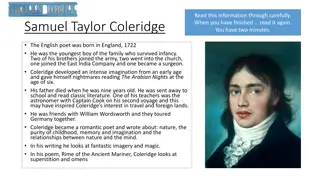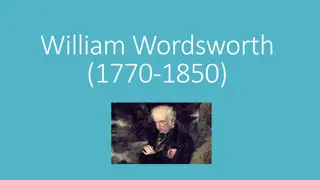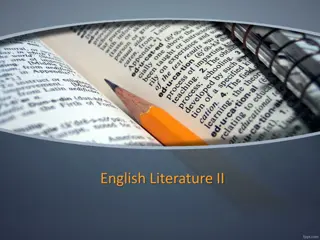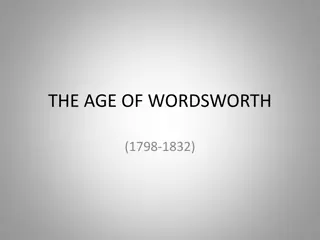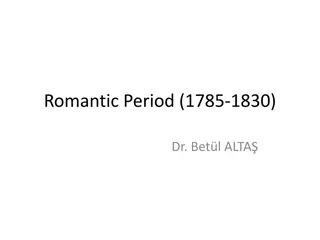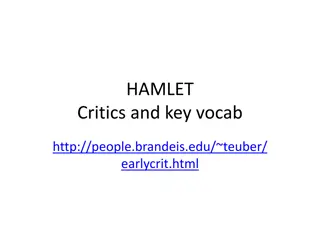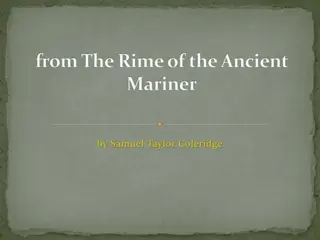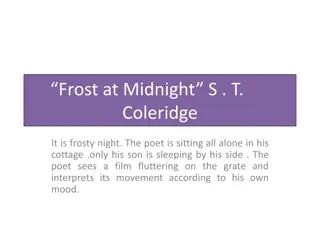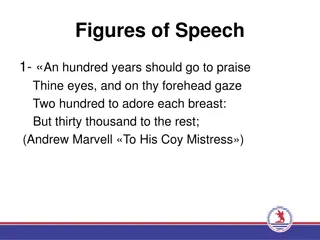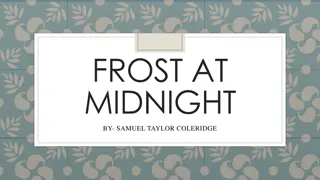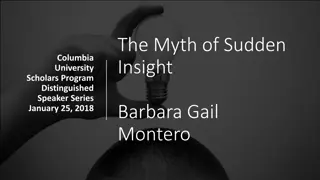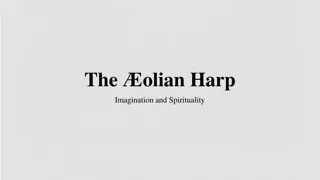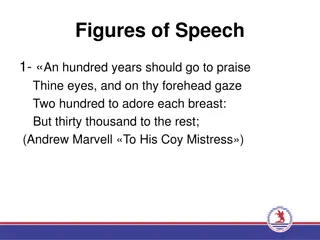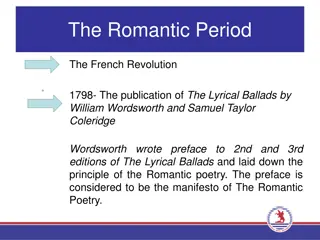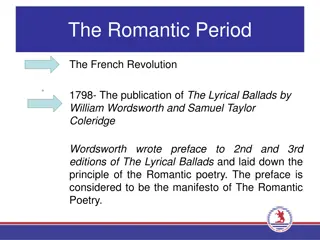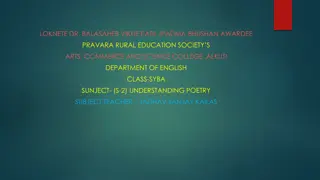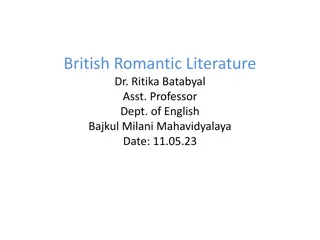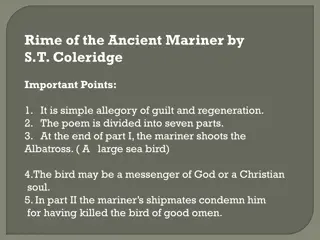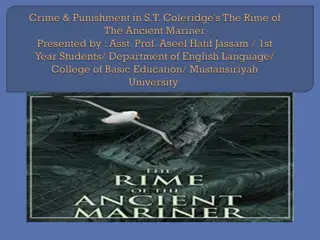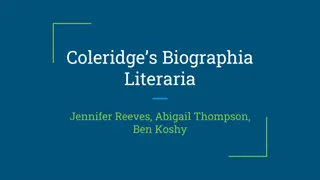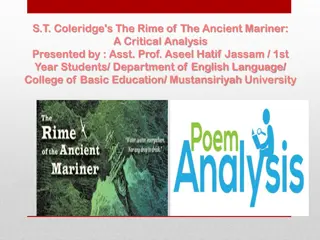Unveiling the Superstitions and Origins of Friday the 13th Fear
Explore the life and works of Samuel Taylor Coleridge, a renowned English poet, and delve into the concept of superstitions, including the fear of Friday the 13th known as paraskevidekatriaphobia. Discover common superstitions, the Christian origins behind the fear of this day, and how it influences
0 views • 13 slides
William Wordsworth (1770-1850): Poet of Nature and Memory
William Wordsworth, a renowned English poet, was born in 1770 and his works were inspired by the landscapes of the Lake District. His collaboration with Coleridge in publishing "Lyrical Ballads" marked a significant moment in Romantic poetry. Wordsworth's emphasis on simplicity, nature, memory, and
0 views • 7 slides
The Romantic Period in English Literature: Embracing Emotion and Individualism
The Romantic period (1798-1837) in English literature was marked by a shift towards valuing emotion, individualism, and nature over rationalism and industrialization. Influenced by societal changes, the movement included prominent poets like William Wordsworth, Samuel Taylor Coleridge, and Robert Bu
0 views • 33 slides
The Romantic Age of Wordsworth: An Overview
The Romantic period in English literature, known as the Age of Wordsworth, emphasized emotions, individualism, nature's beauty, and common people's simplicity. William Wordsworth, a prominent English Romantic poet, co-authored Lyrical Ballads with Samuel Taylor Coleridge, and his notable work includ
1 views • 23 slides
The Impact of Political and Social Revolution in the Romantic Period (1785-1830)
England underwent significant changes during the Romantic Period (1785-1830) as it transitioned from an agricultural to an industrial nation, shifting economic power dynamics. This period was marked by wars, inflation, and social upheaval, leading to a revolution in literature and a focus on inner e
1 views • 14 slides
Insights from Critics on Hamlet's Character and Themes
Various critics provide intriguing perspectives on Hamlet's character and the themes within the play. Swinburne emphasizes Hamlet's inner nature as a conflux of forces, while Samuel Johnson views Hamlet more as an instrument than an agent. Von Goethe discusses the challenges faced by Hamlet in fulfi
0 views • 22 slides
The Rime of the Ancient Mariner by Samuel Taylor Coleridge Explained
The Rime of the Ancient Mariner, a classic poem by Samuel Taylor Coleridge, tells the tale of a sailor who shoots an albatross, bringing a curse upon his ship. The poem depicts the consequences of his actions, the stagnant ship, thirsty sailors, and the desolate sea. Through detailed stanzas, the po
0 views • 13 slides
Analysis of "Frost at Midnight" by S.T. Coleridge
In "Frost at Midnight," S.T. Coleridge explores themes of solitude, nature, and self-reflection. The poem depicts the poet sitting alone in his cottage on a frosty night, finding affinity with a film fluttering on the grate. The analysis delves into the poet's contemplation of loneliness, the stilln
2 views • 9 slides
Examples of Figures of Speech in Poetry
This collection showcases various examples of figures of speech used in poetry by renowned poets such as Andrew Marvell, Coleridge, Wordsworth, R.S. Thomas, and John Donne. The excerpts include metaphors, similes, personification, and other literary devices, offering a diverse range of creative expr
1 views • 10 slides
Coleridge's Cardinal Points of Poetry in Biographia Literaria
Coleridge's Chapter 14 in Biographia Literaria delves into the cardinal points of poetry, emphasizing the power to evoke reader sympathy through truth to nature and novelty through imaginative coloring. He discusses the difference between poetry and prose, highlighting the poet's role in crafting or
1 views • 37 slides
Frost at Midnight by Samuel Taylor Coleridge
In "Frost at Midnight," Coleridge reflects on the stillness of the night, the tranquility of nature, and the presence of his sleeping infant. The poem evokes a sense of calm and introspection as the speaker contemplates the interconnectedness of the world around him. Through vivid imagery and contem
0 views • 7 slides
Insights and Creativity: Exploring the Myth of Sudden Inspiration
Explore various instances of sudden insights throughout history, from Coleridge's Kubla Khan to Archimedes' Eureka moment. Delve into different perspectives on the nature of sudden insights, including divine inspiration, unconscious processes, and the role of business-like usual thinking in fosterin
0 views • 34 slides
The Olia Harp: Imagination and Spirituality in Poetry
The poem "The Olia Harp" from the poetry collection "Sara" explores themes of love, feelings versus reason, and the inner workings of the creative mind. The speaker contemplates the role of poetic inspiration, the tension between idealism and tradition, and the use of natural imagery as symbols for
0 views • 11 slides
Exploring Figures of Speech in Poetry
Dive into the world of poetic expressions with a collection of famous figures of speech from renowned poets like Andrew Marvell, Coleridge, Wordsworth, and John Donne. Explore the rich imagery and metaphorical language used to convey deep emotions and vivid narratives in these classic literary works
0 views • 10 slides
The Romantics: Poetry and Revolution in the French Revolution Era
The Romantic Period was marked by the publication of "The Lyrical Ballads" by Wordsworth and Coleridge, setting the principles of Romantic poetry. Emphasizing emotions and nature, Romantic poets like Wordsworth, Shelley, Coleridge, and Keats used everyday life and rural language to express their fee
0 views • 6 slides
The Romantic Period: Influence of the French Revolution on Poetry
The French Revolution of 1798 had a profound impact on poetry during the Romantic Period, exemplified by the publication of "Lyrical Ballads" by William Wordsworth and Samuel Taylor Coleridge. Wordsworth's preface to the collection laid out the principles of Romantic poetry, emphasizing the expressi
0 views • 6 slides
Romantic Poetry and Poets of the Romantic Era
Romantic poetry is characterized by emotional spontaneity, self-expression, and a deep connection to nature. Key poets of the Romantic era include William Wordsworth, S.T. Coleridge, P.B. Shelley, and John Keats. Their works reflect themes of imagination, childhood, and individual feeling, shaping t
0 views • 8 slides
Exploration of British Romantic Literature through the Works of Samuel Taylor Coleridge
British Romantic Literature underwent a significant shift from the strict rationality of the 18th century to embracing imagination, nature, and emotion in the 19th century. This shift is exemplified through the works of Samuel Taylor Coleridge, particularly his unfinished epic poem "Christabel." The
0 views • 5 slides
Analysis of "Rime of the Ancient Mariner" by S.T. Coleridge: A Journey of Guilt and Redemption
This analysis of "Rime of the Ancient Mariner" by S.T. Coleridge delves into the allegory of guilt and redemption portrayed in the poem divided into seven parts. It explores the consequences of the mariner shooting the Albatross, the themes of death and revival, and his reconciliation with God's cre
0 views • 4 slides
Exploration of Sin, Suffering, and Salvation in "The Rime of the Ancient Mariner
Coleridge delves into themes of sin, suffering, and salvation through the narrative of the ancient mariner, highlighting the consequences of a heinous act and the subsequent journey of repentance and redemption. The pivotal role of the Albatross symbolizes the interconnectedness of humanity and the
0 views • 5 slides
Understanding Coleridge's Biographia Literaria Through Imagination and Analysis
Explore Samuel Taylor Coleridge's seminal work "Biographia Literaria" through the lens of imagination and literary analysis. Delve into his perspectives on imagination, fancy, and the nuances of creativity. Uncover the depth of his philosophical views on reality, the supernatural, and the mind's mys
0 views • 10 slides
Analysis of S.T. Coleridge's "The Rime of the Ancient Mariner
S.T. Coleridge's "The Rime of the Ancient Mariner" is analyzed in detail, focusing on its lyrical ballad form, the mariner's voyage of learning, and the consequences he faces after committing a heinous act. The poem delves into themes of accountability, acceptance, forgiveness, and repentance as the
0 views • 9 slides
